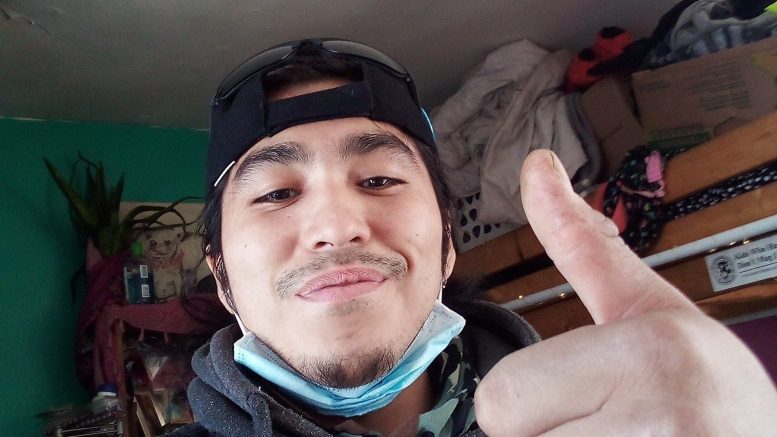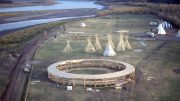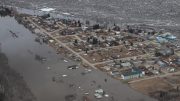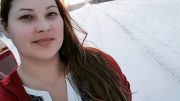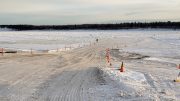Disclaimer: This story talks about family violence, addiction and sexual assault.
Intergenerational trauma is a serious reality for many northerners.
With on the land healing camps, Indigenous peoples have a healthy way to share their experiences.
Ever since the Dehcho First Nations hosted a 30-day healing program called Nezųh Aoht’é Gha Edek’eh Eghálaęhnda (Journey to My Best Self).
They came together at Ekali lake in Tthets’éhk’edélı (Jean Marie River) First Nation territory before moving to Kátł’odeeche First Nation’s Dene Wellness Centre for the chance to heal holistically, on their terms.
The program took place from March 20 to April 18.
Ian Horesay, Dehcho First Nations
Ian Horesay is a 27-year-old Dene and the youngest participant in the program.
“I never talked about this, ever,” Horesay said.
Horesay’s life was dominated by drugs and alcohol at a young age. He says he was lonely, ostracized and, ultimately, lost. A reality he said is far too common for youth in the communities of the NWT.
“It’s not who I am,” he said.
At six years old, Horesay remembers seeing his mother’s hands wrapped around his stepfathers’ neck, in an alcohol-induced rage.
“I didn’t know what to do,” he said. “I didn’t know how to use the phone.”
At that moment, Horesay said he was so stunned by fear. What he didn’t know was how this event would affect him for the rest of his life.
The traditional home and school setting were always uncomfortable for him.
“Deep down inside of me, I craved for the bush life. . . I had a feeling I was stuck.”
“I had no friends,” he said, so “I wrongfully numbed myself with unhealthy coping mechanisms.”
Horesay is referring to the unique experiences that brought him to the camp and although he’s tried to suppress those memories, he admits that has only made things worse for his mental health.
He said this 30-day healing program was more than a way to deal with trauma but a new way to find himself in the process, on the land.
He’s been sober since the start of the program in March.
The program allowed him to “get in touch with his inner Dene,” he said. Something he never really had the chance to experience living in Yellowknife.
“It made me feel really good about myself, just being Aboriginal.”
Horesay plans on continuing his healing journey by checking into the Arctic Indigenous Wellness Camp in Yellowknife.
Brandon Buggins,Łı́ı́dlı̨́ı̨́ Kų́ę́ First Nation
“I didn’t have any way to express my feelings.”
Brandon Buggins is a single father and has been struggling with alcohol addiction since he was 14.
“(Intergenerational trauma) does have some impact,” he said.
Having his parents experience the residential school system, being “stripped of their dignity” and way of life affected Buggin’s understanding of what it means to be a husband and a father.
Buggin’s three young children are the main reason he signed up for the program.
“I want them to see me as a better person, better man.”
He remembers stumbling upon the program through social media, after relentless searching for a way to heal.
Given the opportunity, he was able to make that connection with himself and the land. Being sober helped mend that connection, he said.
He said he hasn’t been able to go out on the land for three years and that has contributed to the decline of his mental health.
Another benefit to the program was the in-person approach to counselling.
“I can’t really open up over the phone when I can’t see their face,” he said. This has been an ongoing issue for Buggins, as many wellness services during the pandemic have been offered virtually or by phone.
“I’m not just some dude that’s wandering around drunk aimlessly,” he said. ” That’s not the guy I want to be.”
Buggins is excited to get back into his community and volunteer his labour into making fire-pits and other projects.
“I got a lot of years ahead of me. Hopefully, I can maintain that sobriety and just keep on the right path.”
Mavis Marie Jumbo, Sambaa K’e First Nation
Mavis Marie Jumbo is a 46-year-old Dene woman.
She was five years old when she was sexually assaulted – but that’s just the beginning of a long list of traumatic events, she said.
Much like Horesay and Buggins, Jumbo came to the program to identify and deal with her trauma.
Jumbo says she was “losing people left and right.” and in the process losing herself.
The death of her friends and family was too much for her to bear.
This led her to lose her Dene way and begin abusing alcohol, she said.
She also never felt connected to Yellowknife.
In coming to the program, she said, “I decided to come home.”
Being on the land was a major contributor to Jumbo signing up, in addition to the Dene counsellors.
Jumbo says she relates better to them compared to other southern counsellors she has had in the past.
“It’s so important because they can understand us,” she said. ” They’re Dene and they can speak our language.”
The camp also gave Jumbo a chance to practice her traditional language of Dene Zhatié.
Jumbo says the program has given her the necessary tools to handle her traumas in a healthy way and will continue to practice smudging and meditating on her journey.
Jumbo says she wouldn’t change her past experiences for anything, “because it made me who I am today.”
“This process made me realize I’m a very strong person,” she said. “Everything that happened to me, I was able to overcome and still be able to tell that story.”
Building trust and safety
Frank and Beverly Hope, owners of Shakes the Dust Hope Consulting, organized the program.
“We’re dealing with historical trauma, addictions, mental health, wellness,” says Frank.
The pair have been running their business for over 30 years, giving them experience catering healing programs to Indigenous peoples.
“A lot of what we do is we build a sense of trust and safety,” said Beverly.
Most of the time, people just want to be heard, she adds.
Kristen Tanche is the regional health and wellness coordinator for Dehcho First Nations.
“We need to see more Indigenous methods of healing,” she says. “The beauty of this type of programming is that you see more of a focus on healing through culture, language, music and art.”
Tanche says she hopes she is able to secure funding and bring this program back next year.

